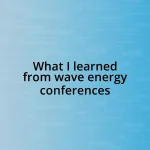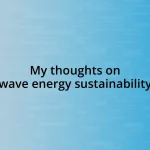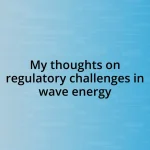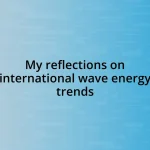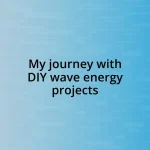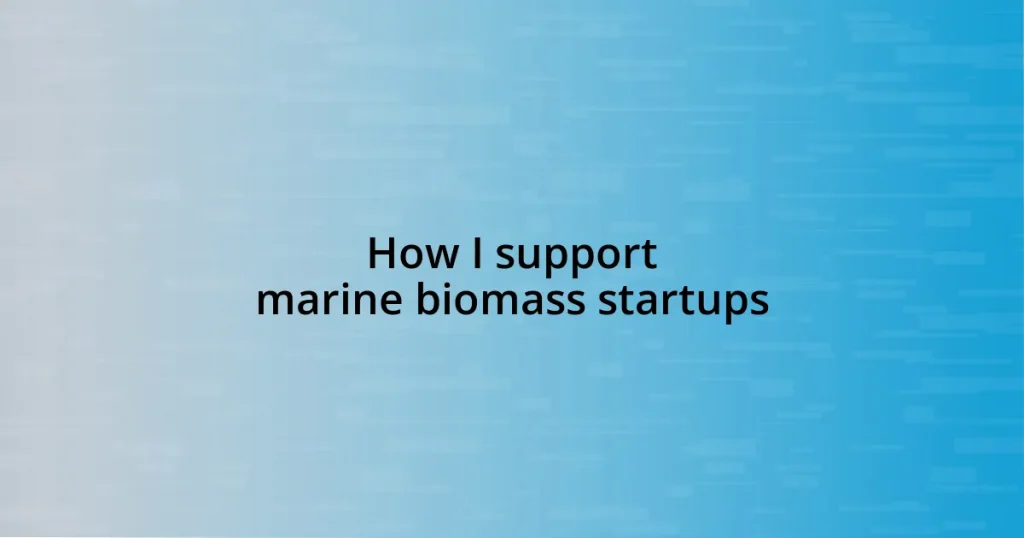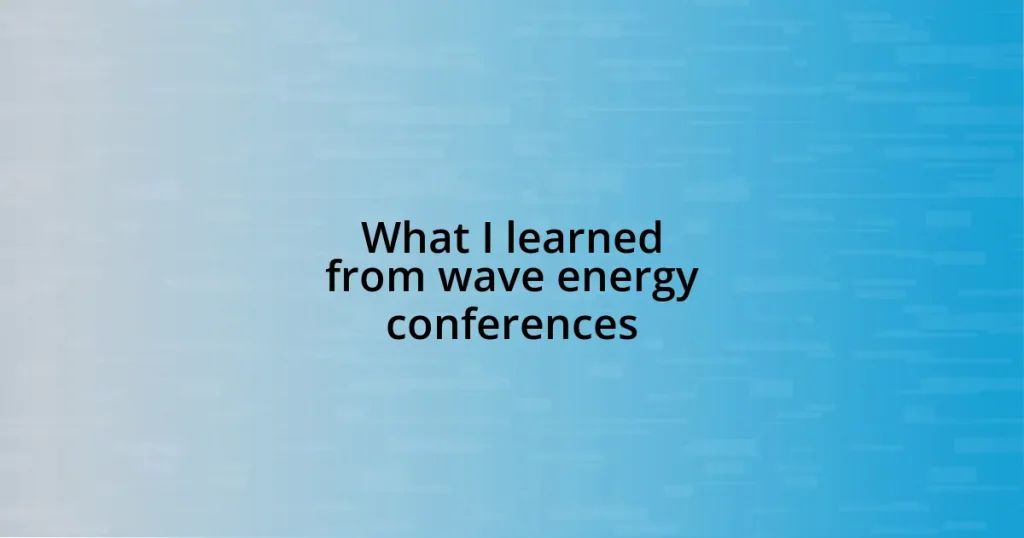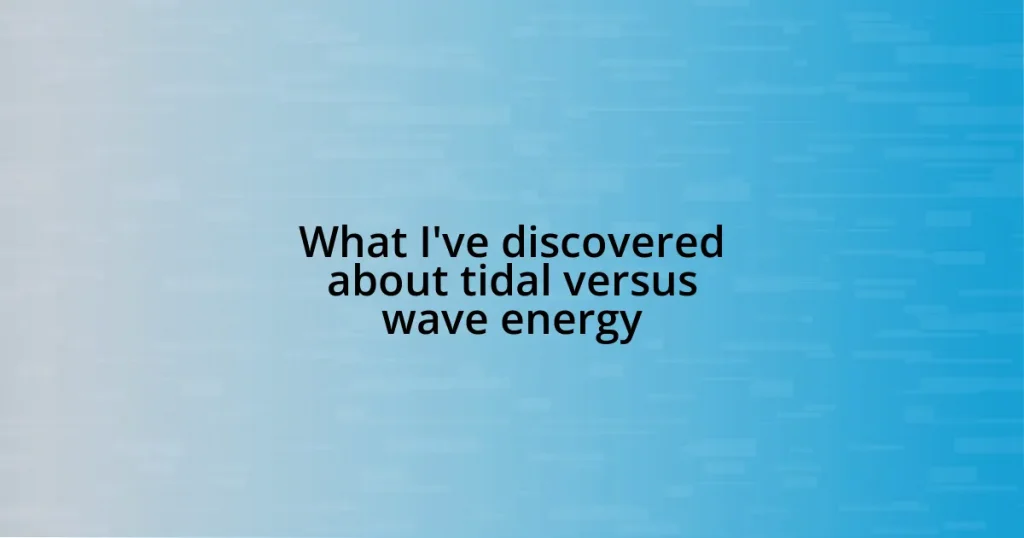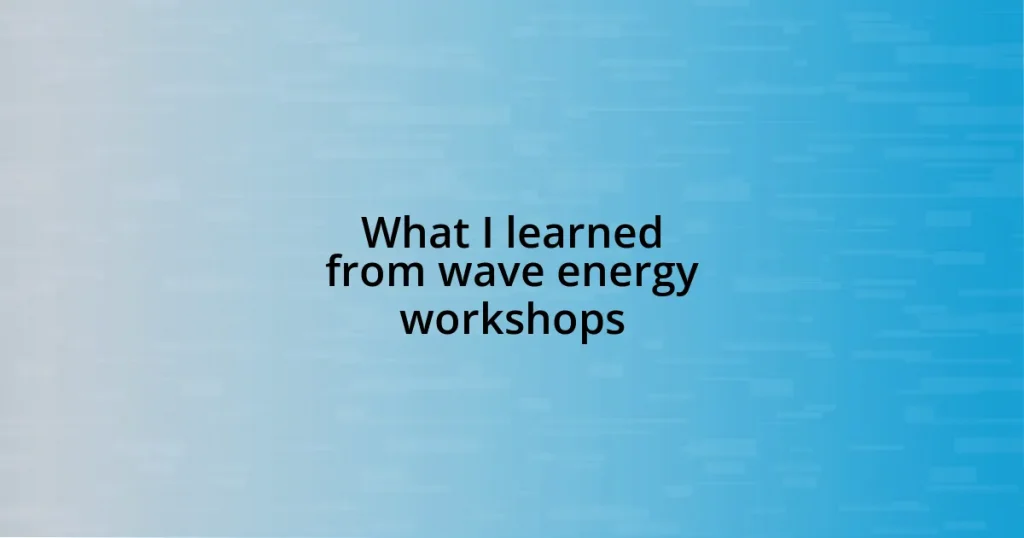Key takeaways:
- Marine biomass startups offer sustainable solutions, like seaweed packaging, which can replace harmful plastics and promote environmental resilience.
- Key challenges include securing funding, navigating regulatory environments, and competing with established industries.
- Effective support strategies include mentorship programs, collaboration with research institutions, and diversifying funding sources like crowdfunding and angel investors.
- Future trends indicate a shift towards sustainable practices and circular economy principles, repurposing marine by-products and meeting growing consumer demand for responsibly sourced products.
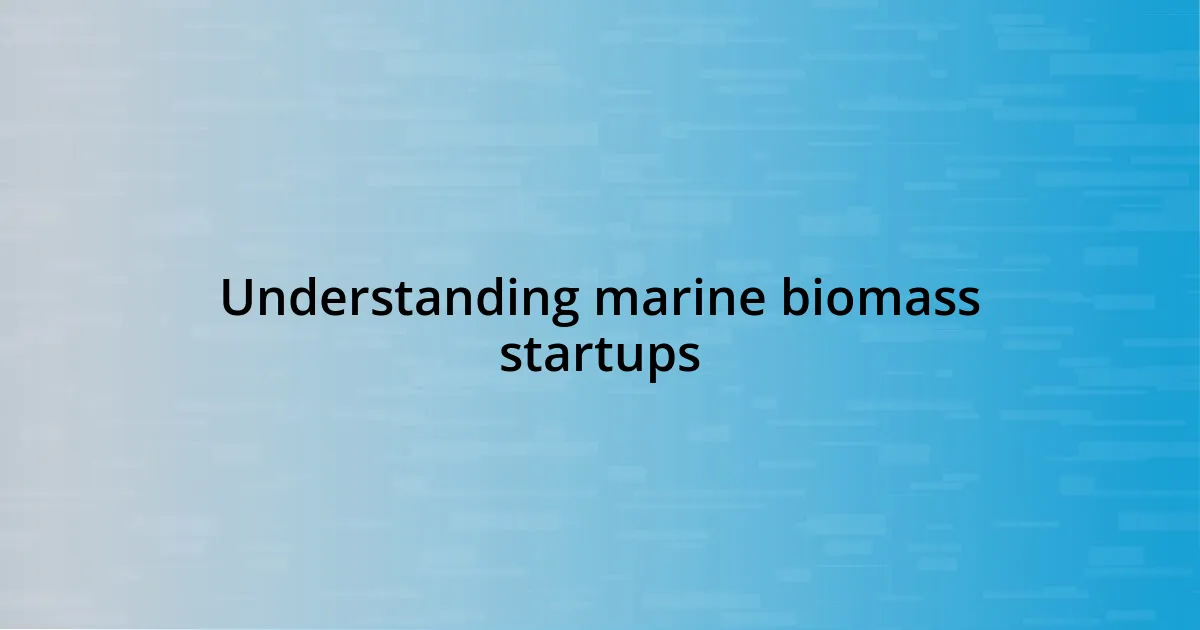
Understanding marine biomass startups
Marine biomass startups are innovative ventures that harness the potential of oceanic resources for sustainable products. From my perspective, it’s exciting to witness how these companies not only contribute to environmental sustainability but also pave the way for new economic opportunities. Have you ever considered how much of our world is unexplored, particularly beneath the waves?
I remember attending a conference where a passionate entrepreneur presented their seaweed-based packaging solution. It struck me to see how something as simple as kelp could potentially replace harmful plastics. The enthusiasm in the room was palpable, as we all recognized the dual power of marine biomass: protecting our environment while driving economic resilience.
These startups often face challenges, including regulatory hurdles and the need for robust supply chains. Yet, watching them push through adversity is inspiring. Are they not the pioneers we need in a world yearning for change? I believe it’s this fearless spirit that sets them apart and ignites hope for a more sustainable future.
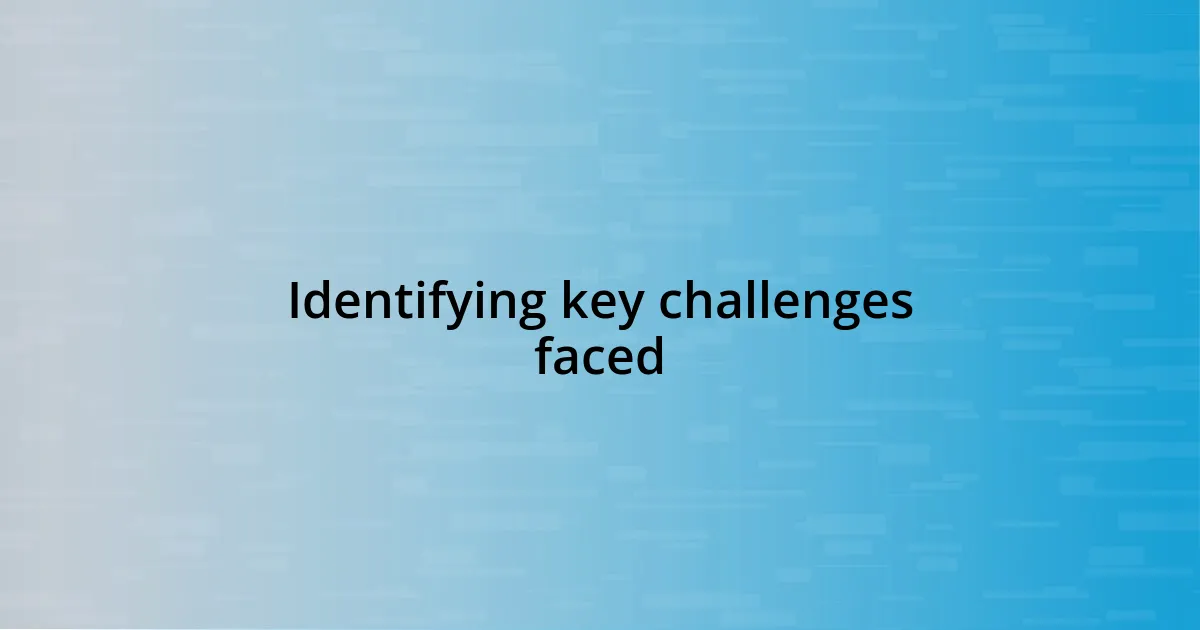
Identifying key challenges faced
One of the most pressing challenges I observe in marine biomass startups is securing funding. Investors often need extensive evidence of market viability before they’re willing to take a leap of faith. It’s reminiscent of my early days in the innovation sector; I faced skepticism that felt overwhelming at times. I remember a particular pitch session where I struggled to convey the significance of our project. The tension in the room was thick.
Identifying these hurdles that marine biomass ventures encounter can be enlightening:
- Limited access to initial capital
- Uncertain regulatory environments and approval processes
- Competing with established industries (like petroleum-based products)
- Difficulty in scaling operations due to logistical constraints
Additionally, navigating regulations can be a maze without clear directions. This uncertainty can deter potential entrepreneurs who might have brilliant ideas but feel intimidated by the bureaucracy. When I reflect on the most successful startups I’ve watched flourish, they possessed a relentless perseverance to innovate despite such obstacles. Their journeys remind me that challenges are often catalysts for creativity and change.
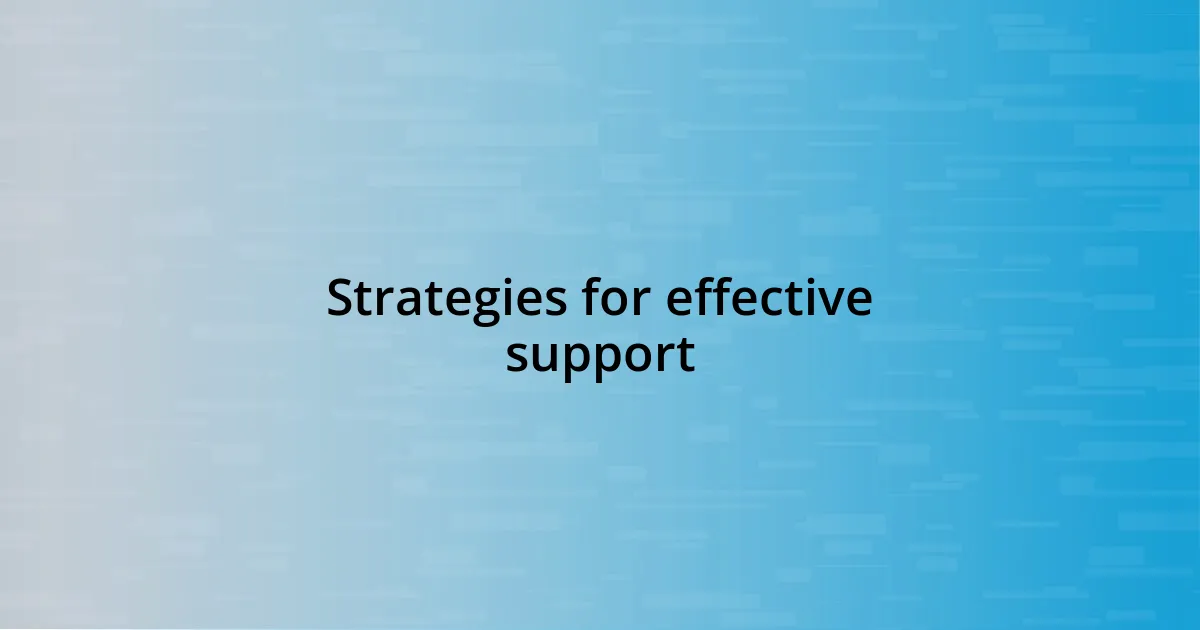
Strategies for effective support
To effectively support marine biomass startups, it’s crucial to create a nurturing ecosystem. I’ve often seen that mentorship programs play a pivotal role, guiding entrepreneurs through the rocky terrain of business development. When I was involved in a similar initiative, it felt rewarding to share insights that transformed indeterminate ideas into actionable strategies. How powerful can a single piece of advice be? It might just spark the next big innovation!
Collaboration with research institutions can also enhance innovation in this field. I recall a project where a startup worked alongside scientists to develop sustainable harvesting methods for seaweed. The symbiosis between these entities not only fostered technological advancement but also provided students with hands-on experience. Isn’t it fascinating how partnerships can blend knowledge and creativity, paving the way for breakthroughs that distinctly impact the marine ecosystem?
Finally, securing funding tailored to meet the unique needs of these ventures remains essential. From my experience, utilizing crowdfunding platforms can democratize access to capital, allowing passionate supporters to invest in promising ideas. One startup I admired successfully raised funds this way; witnessing their journey fostered a sense of community that felt invigorating. Supporting marine biomass startups shouldn’t just be a financial transaction; it should embody a collective mission towards sustainability.
| Strategy | Description |
|---|---|
| Mentorship Programs | Provides guidance and support for entrepreneurs navigating early-stage challenges. |
| Collaboration with Research Institutions | Fosters innovation and provides practical solutions through collective expertise. |
| Crowdfunding | Allows a diverse range of investors to support ideas, building a community around them. |
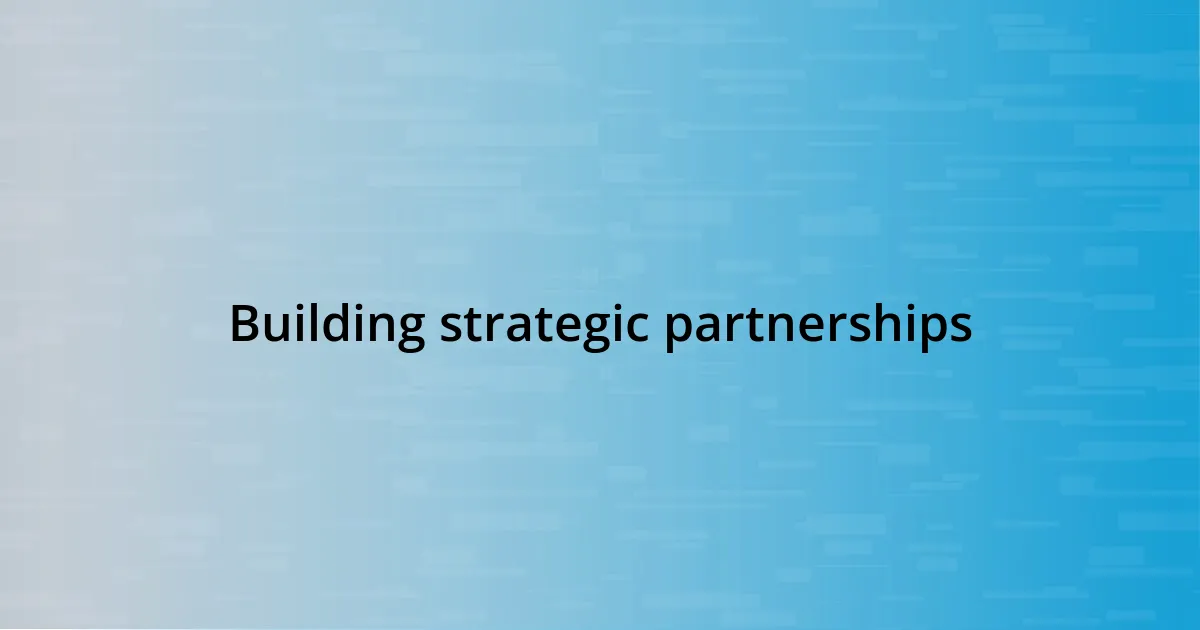
Building strategic partnerships
Building strategic partnerships is vital in the marine biomass sector. I remember when a startup I was involved with partnered with a local fishing community. This collaboration not only helped foster trust with stakeholders but also opened access to sustainable harvesting practices. It struck me then—how often do we overlook the power of community-based partnerships in driving innovation?
I’ve witnessed firsthand how joint ventures with established companies can accelerate growth. One particular collaboration involved a marine biomass startup working with a major food manufacturer. They shared resources and knowledge, leading to groundbreaking product development that neither could have achieved independently. Isn’t it incredible how melding expertise from different realms can amplify impact and success?
Networking plays a crucial role too. Joining forums and attending conferences can be a game-changer. I recall a chance meeting at an industry event that led to a crucial partnership for a fledgling startup. The unexpected connections you make sometimes can lead to the most fruitful collaborations. How many opportunities have I let slip by simply because I hesitated to reach out? Partnerships are about more than contracts; they are about shared visions and the collective pursuit of sustainability.
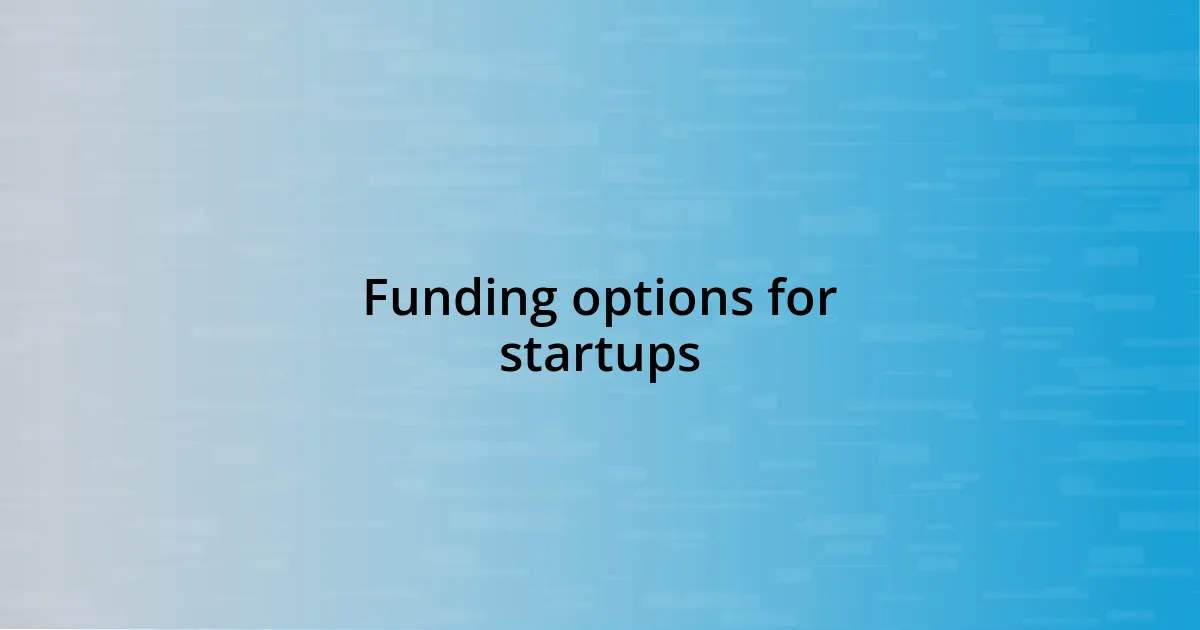
Funding options for startups
Funding a startup in marine biomass is a multifaceted journey, and I’ve found that exploring various avenues can be incredibly beneficial. For instance, venture capital firms often seek innovative solutions in sustainability, and I recall attending a pitch event where startups showcased their concepts. The energy in the room was palpable; it was inspiring to see passionate entrepreneurs connect with investors who genuinely believed in their vision. Could a well-structured pitch turn a daunting idea into a financial reality?
Another funding strategy involves grants from government bodies or NGOs focused on environmental sustainability. I remember a startup that secured a competitive grant designed to support innovations in marine technologies. This financial boost not only provided necessary resources but also validated their mission, instilling a deep sense of purpose in their team. Isn’t it amazing how external recognition can fuel internal motivation?
Lastly, angel investors can be a game-changer for early-stage marine biomass startups. A friend of mine started with limited resources, yet he leveraged his personal network to find an angel investor passionate about marine conservation. Their partnership blossomed; the investor not only provided funding but also wisdom gained from years in the industry. What better way to align financial support with shared values and goals? By diversifying funding sources, these startups can navigate the complexities of growth while focusing on their core mission.
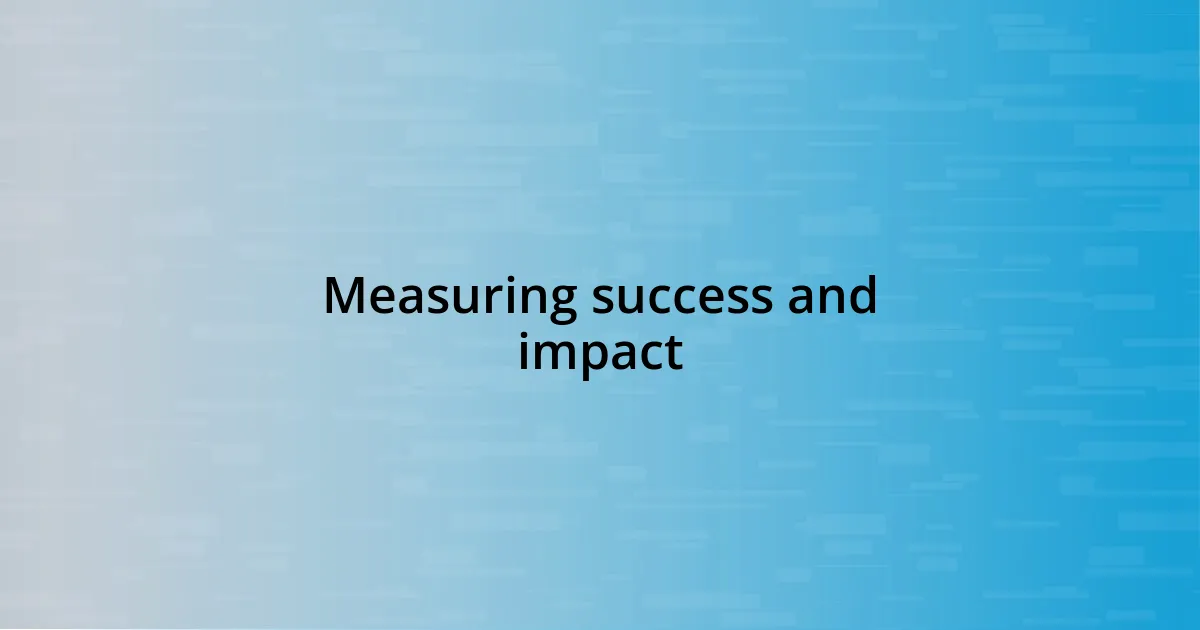
Measuring success and impact
Measuring success and impact in marine biomass ventures goes beyond just financial metrics. I’ve often found that qualitative measures—like community engagement and environmental benefits—can be equally telling. For example, during one project, we tracked not just our revenue growth but also local fish populations returning to harvest zones. Isn’t it rewarding to see how successful business practices can simultaneously support marine ecosystems?
One of the most enlightening moments in my career came when we implemented a feedback loop with local stakeholders to assess our impact. By collecting insights from those directly affected by our operations, we were able to adapt our practices significantly. It really underscored for me how creating spaces for open dialogue can lead to greater accountability and stronger relationships. Have you considered how regularly engaging your community could shape your business decisions?
I also believe that measuring employee satisfaction within marine biomass startups is crucial. A thriving team often indicates a healthy startup culture that can bolster overall effectiveness. I remember a time when we introduced employee surveys, and the feedback led to positive changes that increased morale and, subsequently, productivity. Isn’t it fascinating how the satisfaction of individuals can ripple out to influence the larger mission?
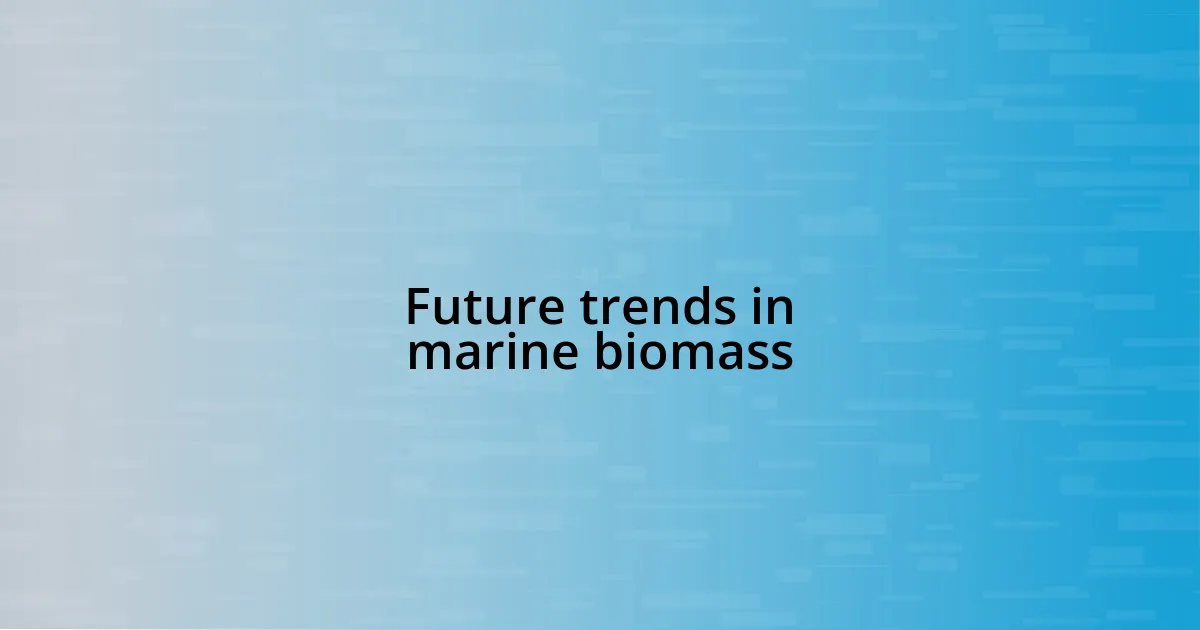
Future trends in marine biomass
I see a budding interest in sustainable practices within marine biomass that will shape the industry’s future. Recently, I attended a conference where innovators discussed new technologies that extract more value from marine sources while preserving ecosystem integrity. It struck me how the conversation shifted from exploitation to stewardship. Isn’t it exciting to think about the potential for nature-based solutions to address global challenges?
The trend toward circular economy principles is gaining momentum, particularly in how we utilize waste from marine biomass. I’ve witnessed how startups are creatively repurposing by-products into bioplastics and nutraceuticals. It’s not only a win for sustainability but also opens new markets. Can you imagine the impact we can make when viewing waste as a resource rather than a burden?
Emerging consumer demand for responsibly sourced marine products is also a game-changer. I remember discussing with a friend who runs a seafood company how transparency in sourcing is becoming a selling point. More consumers want to know where their food comes from and how it has been harvested. This shift opens opportunities for marine biomass startups to cultivate relationships with informed customers. Don’t you think that embracing this consumer consciousness can drive innovation and set businesses apart in a growing market?

